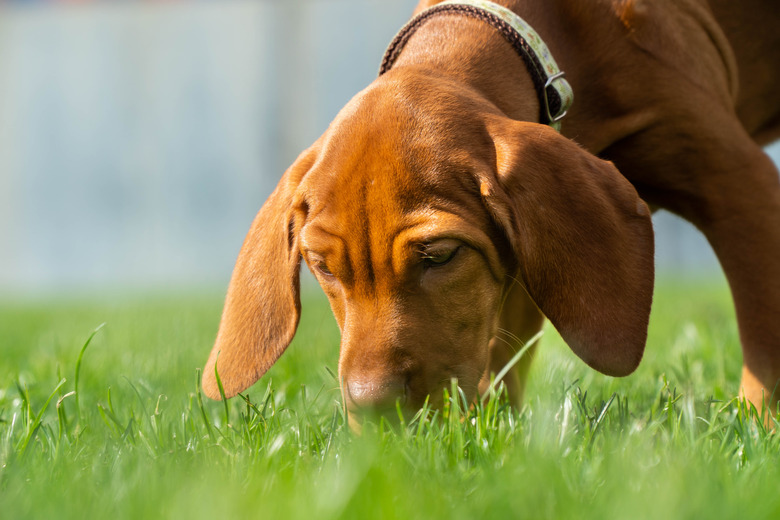Why Does My Dog Smell His Urine?
Why do dogs sniff their pee? Dogs smell their own urine for a variety of reasons, and it's common behavior. While it might gross you out, sniffing his own urine, the butts of other dogs, and poop he finds on the ground are all habits any dog practices. The reasons have to do with territory marking, familiarizing themselves with other animals, and even health checkups, believe it or not. Understanding why your pooch does this will help you get used to seeing it.
Dogs process information with their nose
Dogs process information with their nose
A dog's nose is a very important part of her anatomy and is where she gets much of her information about the world. A dog's nose can contain up to 300 million olfactory receptors compared to about 6 million in humans. It works in conjunction with the dog's brain, which is 40 times stronger than a human's when it comes to analyzing scents.
You've probably heard that dogs are used to sniff and detect drugs at airports and border crossings, but dogs are now being used to help detect diseases in humans, such as cancer and COVID-19.
What information do dogs get from sniffing pee?
What information do dogs get from sniffing pee?
Why do dogs smell their pee? One reason is because a dog's urine can contain information about the pet's diet, sex, health, reproductive status (spayed, neutered, or in heat), and other data. This helps dogs understand more about their human family members, other animals in their surrounding are, and even themselves. Dogs tend to check other dogs' urine more than their own when they get older, as they have learned about their own body and have become more interested in other dogs.
It’s about territory marking
It's about territory marking
A key reason dogs urinate when and where they do is to mark their territory. When a dog marks his territory with urine, he's telling other dogs, "Stay away — this is my yard/home." Dogs who come across another dog's urine might respect that dog's scent marking or might urinate on the other dog's urine or poop to send a message of "not so fast!"
When a dog marks his own territory, he often smells the urine to make sure it sends the right message. For example, if another pet parent lets her dog relieve himself in your yard, your dog might want to mark that spot and then check to see if he left enough urine to make his point by overpowering the scent of the other dog's urine.
It’s a self-checkup
It's a self-checkup
Just as dogs can use their nose to tell if a human has a medical issue, so can she use her nose to check out her own health status. This might be especially important if she hasn't been feeling well or if she's been given a new type of food or medicine. Her urine scent will give her an indication if everything is OK, so sometimes, she's just checking to make sure everything is on track.
It’s about communication
It's about communication
Dogs know that other dogs smell their scent markings, so they might leave a urine deposit just to say hello to another pet they recognize (from his urine scent) or to let other dogs know, "I've been here recently." Dogs also smell the ground to see if another dog has been there recently and might respect that dog's messaging that this is his turf.
Out of respect or fear, your dog might then choose to urinate in another spot. In other cases, your dog might just be curious about the message another dog has left, such as his sex, health condition, or how long ago he was there.
Handling the behavior
Handling
the behavior
Don't correct your dog when she smells her urine or feces or that of another dog. If you're worried about her bringing bacteria into the house, you can bring a wipe that's safe for dogs and clean her nose and face before she comes back into the house.
If your dog licks or eats urine or feces, that can be a sign of a problem. It might be that the dog has detected something wrong with her urine and is trying to get more information. If this happens, contact your vet immediately. Never use negative reinforcement when training a dog. Always use praise for correct behavior rather than punishment for incorrect behavior.
